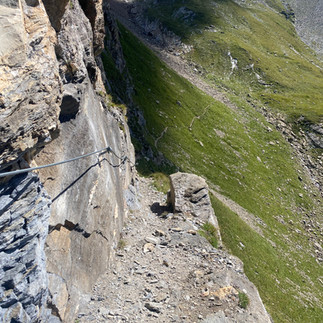Start: Tuxer-Joch Haus (2313m)
Finish: Geraerhütte (2324m)
Today was perfect. Exactly what I needed. It’s a classic Alpine hike that doesn’t go very high, but has everything you want - a light ascent, followed by a section wrapping around the mountain, some meadows, boulders and lots of water. There’s even a few sections with handrails, though for the life of my, I do not understand the choice to place them there. The biggest challenge today has to be the curious goats, who were very interested in the content of my backpack, and would not clear the path. The sheep however were much more suspicious, sheepish even (ha ha), and with extra long hair looked almost alien.
I even stop for a mid-day snooze next to a tiny lake, which is one of my favorite alpine pass-time.
The guide book promises a small challenge towards the very end of the day in crossing the creek near the hut, but I arrive to find a steel-cable bridge over said creek. So all in all - an excellent and easy day.
I make it to the hut at 15:30, just in time to be offered biocolars by one of the waitresses - the hut is a popular home base for mountain climbers traversing the almost vertical rocks above, and you can track thier progress from the hut's large balcony.
I order a warm drink and watch the climbers as I chat to my table-maters: an older Dutch couple who travel to Austria every year fro hiking. This is the first hut when I encounter non-German speakers.

Dinner at the hut is somewhat unusual: you can choose from a menu or get the set menu. You do need to decide your perference as you check-in, and you are then given a wrist band to indicate your preference to the wait staff. Never seen this in a hut before.
At dinner I’m set next to a rambunctious foursome who speak a language I cannot decipher. It’s south Tirol dialect, they tell me proudly, emphasizing the word dialect several times. It’s a dialect of German, but it is so far away from any German I’ve ever heard, let alone understaood. A few days later I would read in “the white war”, a book about world war one in the Italian front, that the Italian Army arriving in South Tirol, expecting to be welcomed as liberators, not only where not welcomed as such, but were also surprised to find that they were unable to understand the locals, with even the German-speakers being challenged by the local dialect. It used to be much more common, of course, but it’s been going in the way of many dialects in Europe - dying together with its speakers.












Comments